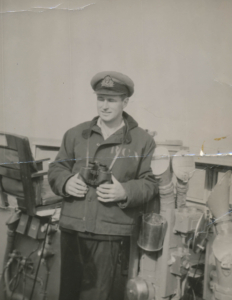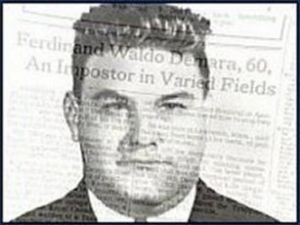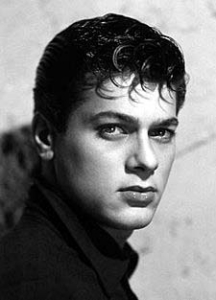The Great Impostor
He was an audacious fake and a master deceiver, and he remains one of the most intriguing figures in Canada’s naval history. Not bad for a man who was neither a sailor nor a Canadian citizen.
Ferdinand “Waldo” Demara, an American by birth, joined the Royal Canadian Navy in March 1951. Using the name Joseph Cyr, he arrived at the recruiting office in Saint John, New Brunswick, and offered his professional services as a doctor.
Canada was involved in a war in Korea, and medical officers were in short supply. Little time was lost in processing this valuable recruit. No-one checked his background or credentials. An enlistment process that should have taken months was completed in days.
Hollywood actor Tony Curtis played Demara in the 1961 movie version of his life, The Great Impostor. Those who knew Demara were quick to point out that Curtis’s movie star good looks in no way resembled Demara, who was beefy and not especially handsome.
“Dr” Cyr was commissioned as a Surgeon-Lieutenant and assigned to the naval hospital in Halifax and subsequently to HMCS CAYUGA. He joined the ship in Esquimalt for her second tour of duty in Korean waters.
Had the authorities found time to dig a little, they might have uncovered the doctor’s secret. He was not qualified to look after the health of the sailors in his charge. Demara had no formal training in any of his many adopted careers as a psychologist, university lecturer, Trappist monk and prison warden, to name but a few.
What Demara did possess was a strong intellect, plus a phenomenal memory. Posing as Cyr, he performed numerous minor surgeries, including dental work on the infected tooth of CAYUGA’s commander, Captain James Plomer. Demara apparently studied up on the necessary techniques by reading text books and relying on the help of his Sick Berth Attendant, plus generous supplies of anesthetic and antibiotics.
Following a commando-style raid off the west coast of Korea, three seriously wounded casualties — all South Korean guerillas – were brought aboard CAYUGA. Cyr aka Demara is said to have removed a bullet from a man’s chest and amputated a foot. His patients not only survived, but Cyr’s fellow officers were so impressed with his coolness that they planned to put his name forward for a medal. Talk of such an award, and the attention surrounding his Korean exploits, was probably Demara’s undoing.
The Canadian Navy apparently discovered Demara was using a false identity after the real Dr. Cyr’s mother spotted a news report in her local paper. War correspondents had picked up the story of the CAYUGA medic and broadcast it far and wide.
The genuine Joseph Cyr, then practising in Grand Falls, New Brunswick, realized the truth. Demara, at the time posing as “Brother John”, a novice monk, had apparently struck up a friendship with Cyr and stolen his medical credentials. Soon after, the bogus doctor showed up at the recruiting centre.
“The RCN, thoroughly embarrassed by the entire affair, declined to prosecute Demara”, notes author Edward C. Meyers in his book about the Royal Canadian Navy in Korea, “Thunder in the Morning Calm”:
“The whole episode, Ottawa decided, was best forgotten as quickly as possible. On his return to Canada, Demara was very quietly, and honourably, released from the service, issued re-hab and back pay plus active service credits in the amount of just under one thousand dollars. He was then driven to the border and turned over to the United States Immigration Office at Blaine, Washington. The Americans had nothing against him in the way of outstanding warrants so, after a few routine questions, they let him go on his way.”

Peter Godwin Chance pictured in 1951. Photo courtesy of The Memory Project
It’s not clear why Demara engaged in his masquerades. He may have suffered from an illness. Perhaps he was simply a brilliant mimic with a short attention span for ordinary life.
The resilient Demara bounced back, going on to forge a series of new personas including law student, cancer researcher, deputy sheriff, and teacher. This last escapade resulted in arrest and six months in prison.
Peter Godwin Chance, who sailed with Demara and once had an infected toe treated by the bogus physician, remembers him as an “affable” man, “…always the life of the party, [though he] neither drank alcohol nor smoked cigarettes.”
When asked to describe his motives, Demara is said to have responded: “Rascality, pure rascality.”
Ferdinand “Waldo” Demara died in 1982.
By Clare Sharpe
Museum staff member/webmaster


 CFB Esquimalt Naval and Military Museum
CFB Esquimalt Naval and Military Museum CFB Esquimalt Naval and Military Museum
CFB Esquimalt Naval and Military Museum CFB Esquimalt Naval and Military Museum
CFB Esquimalt Naval and Military Museum CFB Esquimalt Naval and Military Museum
CFB Esquimalt Naval and Military Museum CFB Esquimalt Naval and Military Museum
CFB Esquimalt Naval and Military Museum CFB Esquimalt Naval and Military Museum
CFB Esquimalt Naval and Military Museum CFB Esquimalt Naval and Military Museum
CFB Esquimalt Naval and Military Museum CFB Esquimalt Naval and Military Museum
CFB Esquimalt Naval and Military Museum CFB Esquimalt Naval and Military Museum
CFB Esquimalt Naval and Military Museum